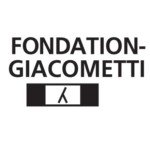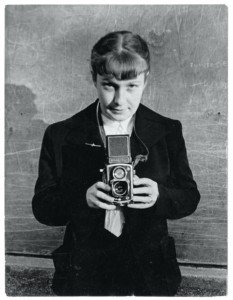The century of Sabine Weiss
Screening in the presence of director Camille Ménager, as part of the Cycle "Le temps de Giacometti"
Auditorium
Free entrance

Camille Ménager's film looks back at the career of the Franco-Swiss photographer Sabine Weiss, who met Alberto Giacometti during the war: "I was friends with his wife, which made it easier for me to get to know him well and photograph him in his studio". She met the couple in the mid-1940s, with whom she remained very close. As a result, she took several hundred photographs of the sculptor's studio and works, some of which are featured in the exhibition in "Le temps de Giacometti".
Camille Ménager met the great photographer in autumn 2021. She recounts the genesis of her film Le Siècle de Sabine Weiss, a documentary produced by Brotherfilms:
"Was it because she was amused to see a young director interested in her work, a camera and attention? She was immediately generous with her time and her words. She opened the doors of her studio and her life to me without a hint of mischief, regularly wondering what I was going to make of everything she told me.
Then, a few weeks into a fragmented shoot, Sabine died. And with her death came the vertigo of a film that would have to be finished without her... While the questions I had when I first met her remained the same, the way I went about finding the answers required a few adjustments.
How did Sabine Weiss develop her work? How did she look at the world? What do her photographs tell us today?
She stopped photographing several years ago. Age and wisdom had allowed her to look back and rediscover her photographs. She was sometimes moved by these faces, these atmospheres, these glances, and often critical of her work.
Her greatest joy, she said, would be to have succeeded in passing on to the generations that followed her the joy she had in watching, observing and photographing human beings in the intimacy of their feelings, so mysterious and so universal.
"I'm not an artist", she used to say. Perhaps she was right, because she is more than that. A craftswoman, a worker in technique and chemistry, a witness to a vibrant half-century. Her life tells the story of the immediate post-war years, of a France emerging from the Second World War bled dry but looking to the future; of the 50s, when she and her husband, the painter Hugh Weiss, were immersed in the effervescence of the artistic avant-garde of the time; of the 60s and 70s, with the rise of advertising and the major fashion magazines like Vogue, Newsweek and Paris Match, for which she worked tirelessly. The transformations of the 90s, with an ever-curious eye - you can feel the soul of a sociologist shining through - towards others, from Burmese monks to the inhabitants of the Val de Marne.
Sabine's life also tells us what it's like to be a woman in a man's world - "Come on, my little granny, get out of the way, let the photographers do their thing", she recalls hearing when she was trying her hand at reporting, among the veteran news photographers. When she wasn't responding to a commission, she set off to capture images in black and white, capturing on film the people who touch her: the little people we never talk about, the children we sometimes forget, the elderly we no longer pay attention to.
(...)".
Camille Ménager, September 2022
Camille Ménager is a writer and director. A historian by training (Paris 1 / Sciences Po doctoral school), Camille Ménager writes and directs history documentaries. She is particularly interested in cross-cutting issues between history and memory, women's journeys and the history of war imagery.
A former director and co-editor-in-chief of France 3's history magazine "L'Ombre d'un doute", over the last ten years she has written and/or directed documentaries on different themes, characters and eras: Les trésors de la Préfecture de police (90' and 2x52', France 5, 2019), Verdun, paysage après la guerre (11', Arte, 2018), La mort de Lady Diana (90', France 3, 2016), Les trésors de la joaillerie française (110', France 5, 2015), Les artistes sous l'Occupation (110', France 3, 2014), Qui était vraiment François Ier? (110', France 3, 2015), Napoléon, le défi de trop? (110', France 3, 2014), Vienne, ombres et lumières (110', France 3, 2014), Le Louvre, palais du pouvoir (110', France 3, 2013), Rudolf Noureev, le prix de la liberté (80', France 2, 2012), La traque de Klaus Barbie (110', France 2, 2012), Au cœur du procès Barbie (52', DVD, 2010).
Previously, she worked as first assistant director and documentalist on several documentary films, including: Mon meilleur ennemi (90'), by Kevin Macdonald (theatrical release 2007), L'avocat de la terreur (134'), by Barbet Schroeder (theatrical release 2008, César for Best Documentary 2008). She has also assisted director Jérôme Prieur on several of his documentaries: Le journal d'Hélène Berr (90'), Vivement le cinéma (80'), Le Mur de l'Atlantique (80').
From 2011 to 2018, she carried out research and teaching activities, leading an artistic workshop with historian Julie Maeck on the making of war images and their reuse in documentary film at Sciences Po, Paris. In January 2008 she published the booklet Le sauvetage des juifs à Paris, 1940-1944 for the Paris City Hall, in participation with the Centre dʼEtudes et de Recherches Internationales and Centre dʼHistoire de Sciences Po.
Recent filmography
Le siècle de Sabine Weiss (59', Brotherfilms, France 5 - Feature selection at the Festival International du Film sur l'Art, 2023), Sur les traces de Gerda Taro (60', Brotherfilms, France 5 - Grand prix Terre(s) d'histoire, Figra, 2021; selection at the Festival international du Film d'Histoire, Pessac, Panorama du documentaire, 2021; selection at the Rendez-vous de l'Histoire de Blois, 2021), Tu seras mère ma fille (90', Brotherfilms, France 5 - selection Terre(s) d'histoire, Figra, 2019; selection Documentaire, festival des créations audiovisuelles de Luchon, 2019).


Sabine Weiss, "Autoportrait", 1953 © Sabine Weiss
